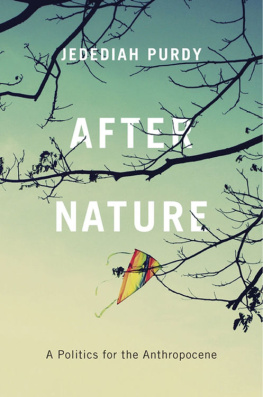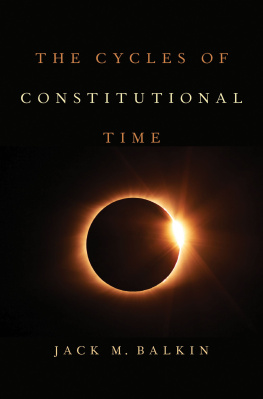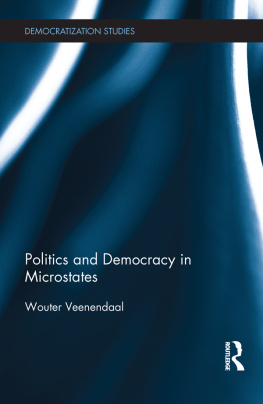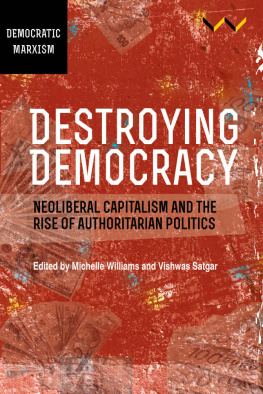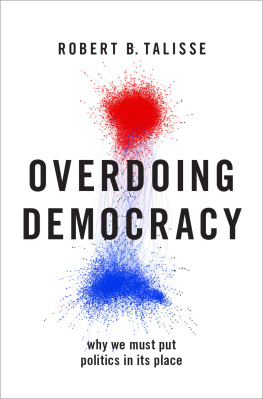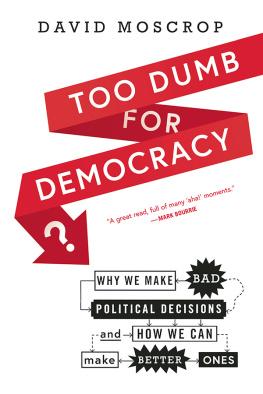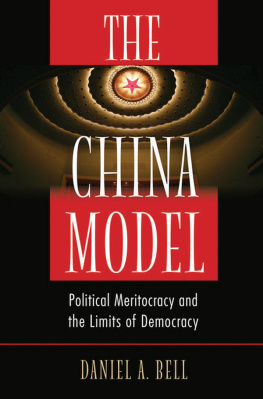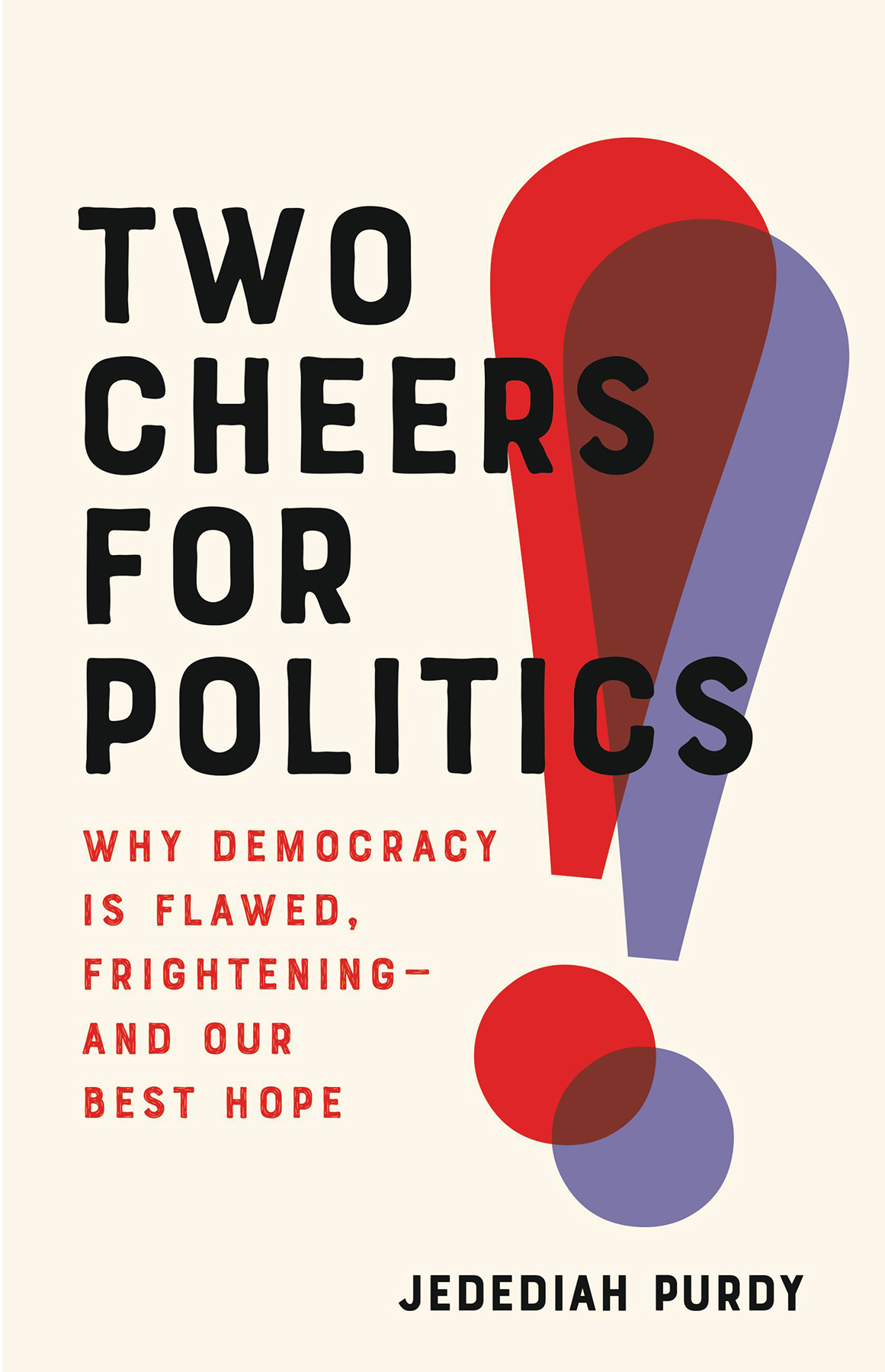Two Cheers for Politics is a powerful antidote to the despair that characterizes discussions of democracy in our times, combining clear-eyed analysis of the challenges democracies face with a refreshing historical diagnosis of how we got to this pointand how we might move beyond it. Jedediah Purdys eloquent book restores moral dignity and political plausibility to the idea of democracy.
Pratap Bhanu Mehta, Princeton University
In this imaginative history of ideas, Purdy provides a provocative account of democracywhat it is, what it has been, and what it might be if only we believed in it. This is a bracing critique of politics as usual and an important defense of democratic life.
Katrina Forrester, Harvard University
What a demanding, profound, and timely book! I started Purdys excavation of anti-political beliefs with a confidence that I both knew and scorned his targets, and found instead an intimate portrait of my own fears and a fascinating genealogy of the antidemocratic frameworks that pass as democratic. Two Cheers for Politics reads easily over rough terraindare we take power for a chaotic we, dare we trust in the incompleteness of shared sovereignty? I strongly recommend this brilliant fabric of our past and possible futures woven together.
Zephyr Teachout, professor of law, Fordham University
Purdys sweeping review of the historical and philosophical underpinnings of democracy reminds us that the problems we face are not new. Concentrated economic interests often try to narrow the scope of what we can achieve through collective political action, but we have the potential to shake loose the cobwebs of our Constitution and give life to a multiracial democracy. Too many have shed blood for the right to vote for us to pretend now that politics dont matter.
Rev. Dr. William J. Barber II, author of We Are Called to Be a Movement
Purdy brilliantly argues that we need politics, and that our politics needs to be democratic. Democracy means voting rights, but also much more: an economy that empowers citizens and a culture where what joins us together matters more than what divides us. The alternative is an apathy and anti-politics which will make justice impossible. We need to defend our democracy and also to build it up and deepen it.
Ro Khanna, member of Congress and author of Dignity in a Digital Age
An essayist and moralist for our generation, long known for capturing the incongruity between our arrangements and our aspirations with great eloquence, Purdy has become the advocate for redeeming democracy from its limitations that we need right now. Addressing how constitutional law and economic hierarchy leave Americans tempted to despair, Purdy avoids blind alleys in search of exits from political impasse, with self-rule by equal citizens a credibleindeed, our onlyhope.
Samuel Moyn, Yale University
Copyright 2022 by Jedediah Purdy
Cover design by Rebecca Lown
Cover copyright 2022 by Hachette Book Group, Inc.
Hachette Book Group supports the right to free expression and the value of copyright. The purpose of copyright is to encourage writers and artists to produce the creative works that enrich our culture.
The scanning, uploading, and distribution of this book without permission is a theft of the authors intellectual property. If you would like permission to use material from the book (other than for review purposes), please contact permissions@hbgusa.com. Thank you for your support of the authors rights.
Basic Books
Hachette Book Group
1290 Avenue of the Americas, New York, NY 10104
www.basicbooks.com
First Edition: August 2022
Published by Basic Books, an imprint of Perseus Books, LLC, a subsidiary of Hachette Book Group, Inc. The Basic Books name and logo is a trademark of the Hachette Book Group.
The Hachette Speakers Bureau provides a wide range of authors for speaking events. To find out more, go to www.hachettespeakersbureau.com or call (866) 376-6591.
The publisher is not responsible for websites (or their content) that are not owned by the publisher.
Library of Congress Cataloging-in-Publication Data
Names: Purdy, Jedediah, 1974 author.
Title: Two cheers for politics : why democracy is flawed-and our best hope / Jedediah Purdy.
Description: First edition. | New York : Basic Books, 2022. | Includes bibliographical references and index.
Identifiers: LCCN 2021054813 | ISBN 9781541673021 (hardcover) | ISBN 9781541673007 (ebook)
Subjects: LCSH: Political cultureUnited States. | DemocracyUnited States. | United StatesPolitics and governmentPublic opinion. | United StatesPolitics and government21st century.
Classification: LCC JK1726 .P87 2022 | DDC 320.973dc23/eng/20220327
LC record available at https://lccn.loc.gov/2021054813
ISBNs: 9781541673021 (hardcover), 9781541673007 (ebook)
E3-20220719-JV-NF-ORI
I magine four history textbooks written in 2050, each one reflecting a different version of our future. They all explain that the 2020s began as a decade of crisis, plagued by a broken climate, deep inequality, and clashes over basic facts like whether vaccines work and how many votes were cast in recent elections. In these decades, the books recall, people around the world asked whether democracy had already failed. They blinked at the future and wondered who would save them.
The first textbook tells how strongmen saved ussome of us, anyway. Their enemies called them nationalists, populists, and bullies, and they gladly played the part. Some of their supporters didnt like the ways their countries were changingin race, language, sex and gender rolesand wanted older codes back in place. Others felt that politics had become a joke, a charade whose only point was to keep well-connected insiders comfortable. They wanted leaders who talked straight evenespeciallyif they offended or alarmed the insiders.
In Poland, Hungary, Brazil, and the United States, these strongmen served their clanspartisan and ethnic. When politicians in the United States said America first! no one doubted which Americans they meant. They treated the country as the property of the right kinds of people, and sometimes they looked after those people. Sometimes they left them to take their chances with pandemics, climate change, and a global capitalism that the strongmen occasionally decried but somehow never actually challenged. Popular loyalty survived these tests of faith. The strongmenand women, soon enoughdid what it took to make sure that only their favored candidates won elections.
In fact, this came to be what democracy meant. Defend our democracy! chanted supporters of Donald Trump Jr. in November 2032, as they mobbed the offices of election boards across the country. After that, the history books explain, it became clear that there was nothing sacred about getting more votes. The point was for the right people to win. After a struggle, they did. The years from roughly 1965 (when the Voting Rights Act became law and the Hart-Celler Act ended four decades in which immigration was tightly restricted and mostly confined to white Europeans) to 2024 are officially remembered as a failed experiment in political equality and cosmopolitanism. The year 2016 is remembered as the beginning of the end for the elite that orbited universities, the professions, nonprofits, political staffs, and legacy media.
The second history book tells the story of how experts saved us. Politicians couldnt solve the climate crisis. Their thinking was narrow and short term, and their constituents combined these limitations with flat-out ignorance and fantasy. Stepping into the breach, the central bankers of the rich countries joined technologists to create a sweeping innovation agenda that halfway saved the planet and was also very profitable. They even shaped their program to soften racial and regional inequality, likening it to a new New Deal, greener and more inclusive than the first. Some would-be strongman politicians railed against the bankers and techies, but the balance of public opinion was for solving problems, and the strongmen faded because they offered no solutions. Other politicians bowed to the experts, who barely bothered to return the courtesy.


